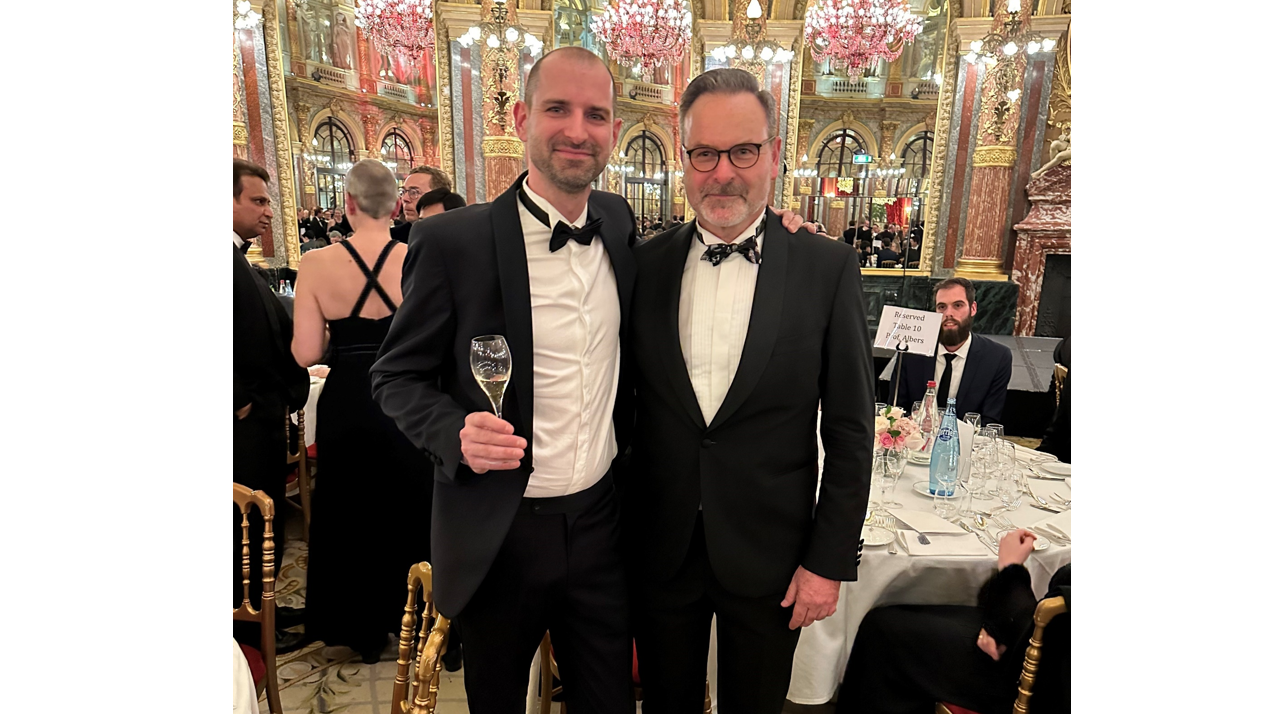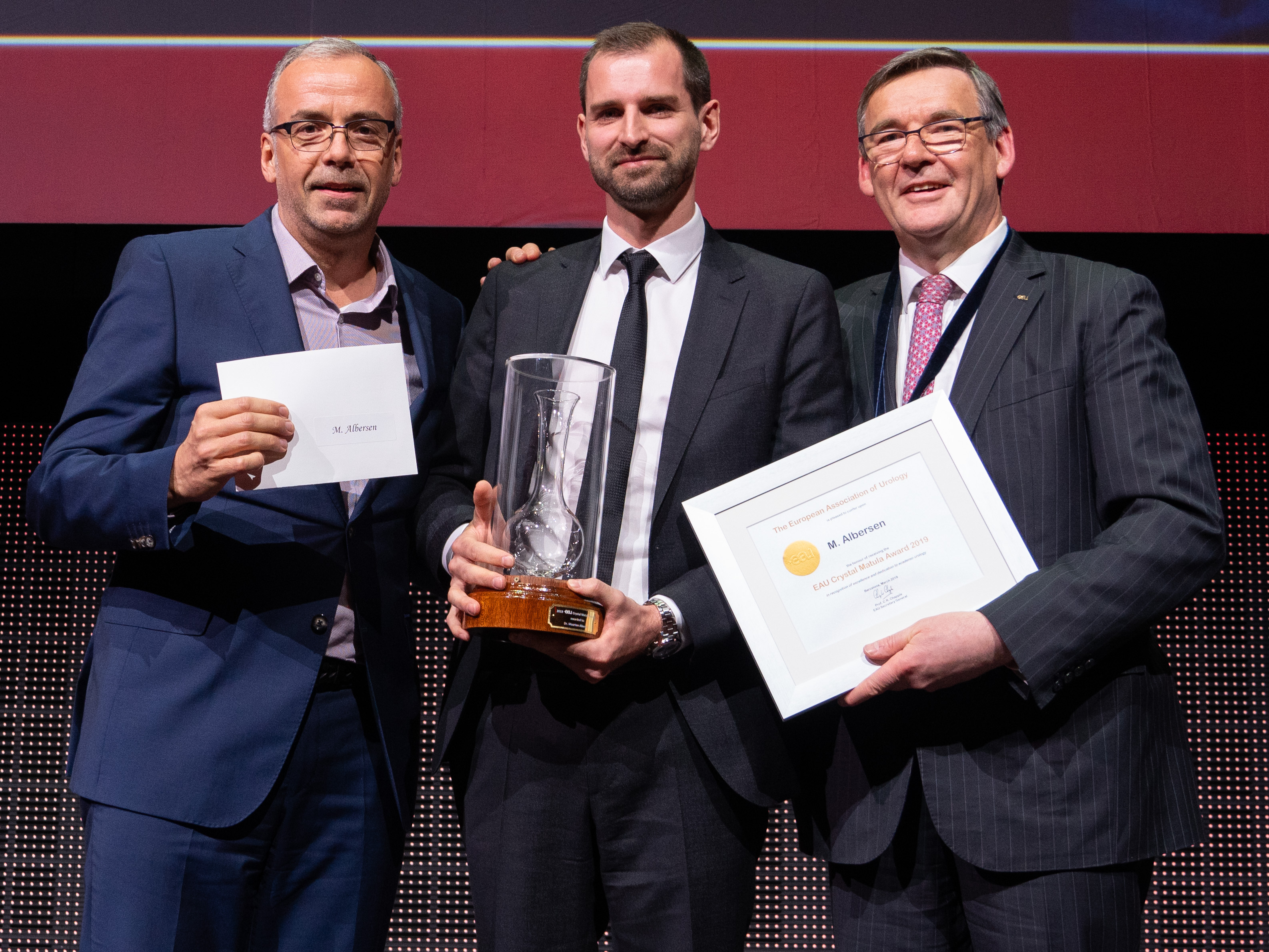“Designing a more personal congress experience”
As the summer turns to autumn and abstract submissions are in full swing, the EAU’s Scientific Congress Office is busy preparing the next edition of the EAU’s Annual Congress: EAU25 in Madrid. It is doing this under the leadership of its new chair, Assoc. Prof. Maarten Albersen (Leuven, BE), who succeeded Prof. Peter Albers (Düsseldorf, DE) after EAU24 earlier this year.
Albersen is an Associate Professor in Urology at the KU Leuven, with a clinical interest in uro-oncology (kidney, penile, testis) and andrology. He is also a researcher in penile cancer. He has been a member of the Scientific Congress Office since 2017 and also sits on the board of the EAU Section of Oncological Urology since 2019.
Prof. Albersen has a long association with the EAU, stretching back to his days as a urology resident. In this interview he introduces himself and lays out some ambitions for the upcoming Madrid Congress, as the Scientific Congress Office (SCO) works to keep the Annual Congress vital, relevant and essential for the world’s urologists.
You recently succeeded Prof. Albers. How are you settling into your new role?
Prof. Albers deserves hearty congratulations for his commendable work, having successfully guided the Annual Congress through some rough seas, especially during the COVID pandemic.
Despite these challenges, he managed to not only maintain the congress’s high standards but also elevate it further by attracting more original trial data and fostering key collaborations, such as with The Lancet Commissions. Remarkably, our delegate numbers in Milan and Paris returned to pre-pandemic levels. These are some big shoes to fill, and the responsibility is significant.
That said, I am up for the challenge. We’ve already had a very fruitful and effective first meeting with the scientific congress office, including several new members who are settling into their roles. There’s a great deal of positive energy and enthusiasm in the office, and we are all working together towards our common goal: delivering the best urology meeting worldwide for our members and delegates. I’m grateful to have such a capable and supportive team behind me, along with the steadfast support of the EAU’s Central Office.

What in your academic or professional background has helped you prepare for this position?
I have been an active member of the EAU since early in my residency, which has allowed me to take on various roles and develop a deep connection with the organisation and its people.
Over the years, I’ve been fortunate to serve on the Young Academic Urologists board, the Penile Cancer Guideline Panel, the ESOU board, and eUROGEN. I also spent seven rewarding years as an associate editor for European Urology, our flagship journal. Before joining the EAU Scientific Congress Office—where I’ve now worked for another seven years—I served as the Scientific Chair for the European Society of Sexual Medicine.
These experiences have collectively shaped my professional background and prepared me for this position. However, I truly believe that leadership in this capacity is a team effort. While I’m honoured to lead, I see our success as the result of shared vision, enthusiasm, and collaboration from all of us.
I’m surrounded by a wonderful team, both at the EAU and at home, which makes all the difference. With their support and the space I’ve made in my scientific and clinical schedule, I’m confident that we’ll continue to build on the strong foundation that’s been laid and work towards an even more successful future together.
With EAU25 coming up, what are the SCO’s priorities in the coming months?
Our key priority moving forward is to enhance the overall experience for congress attendees. While the Annual Congress is always an impressive event, it can sometimes feel overwhelming or even chaotic for participants.
The congress has grown organically over time, so we’ve sometimes seen instances where coordination between the various offices and sections wasn’t as streamlined as it could have been. This occasionally resulted in overlapping topics, sessions, and even speakers, while at other times, delegates found themselves in programme slots that lacked topics of interest.
With the renewed Scientific Congress Office, our goal is to offer the highest-quality content, attract the best data, and strengthen the coherence of the congress under the EAU flag. We’re focused on better integrating the composition of sessions, section meetings, Urology Beyond Europe meetings, and educational courses from our school. By doing so, we aim to create a more seamless and engaging programme for everyone.
Additionally, we’re increasing collaboration with our family of journals, for instance by facilitating sessions that accompany key articles, as well as offering embargoed publication for data submitted to the EAU Annual. This integration will ensure that research and presentations at the congress are immediately impactful and relevant in the broader urological field.
A top priority is also to truly understand what our delegates want and how we can shape the conference to meet their needs and make it future-proof. This will involve investing time and effort into high-quality market research to understand the user experience of EAU delegates.
Finally, we’re focused on individualising the congress experience by catering to the diverse needs of our attendees. To achieve this, we’re working on developing topical ‘tracks’ within the scientific programme that allow delegates to tailor their experience and focus on the areas that matter most to them.
Can you already reveal some new developments that we will see in Madrid, in terms of both congress experience and also science-wise?
In terms of congress innovations, delegates will notice some significant changes in how they interact with the event, both on the website and the EAU app. We’ve worked to make the interface more user-friendly and visually appealing. Previously, the programme was organised from the perspective of a congress organiser, with an emphasis on session types.
Now, we’re shifting the focus to content and topics, allowing delegates to prioritize what truly interests them. We’ll be introducing major disease-specific tracks that cover 80-90% of everyday urology, while also incorporating more niche or specialised topics that can be easily searched for and identified. The goal is to create a more personalised congress experience, tailored to the individual needs and goals of our delegates.
We’re also experimenting with new session types, which you’ll start seeing over the coming years. These might include new debate styles, TED-like talks, and even live podcasting from the stage. While these ideas are still evolving, I’m certainly open to suggestions and eager to see how we can make the sessions even more engaging.
Beyond innovation in session design, we’re also putting a strong emphasis on attracting high-level data. We aim to become the premier platform for original prospective trials in urology to report their primary endpoints. To achieve this, we’re actively engaging with key opinion leaders and trialists, listening to their needs, and working to provide the best platform for groundbreaking research.
On the topic of research, I can also announce a new part of the programme that aims to build a bridge between the clinic and the lab. The EAU’s Research and Pathology Sections, together with the SCO will spotlight basic and translational research in a series of sessions. It will be called EAU Lab and be hosted over the course of two days in its own session room. We will announce more details in the coming months!
Within urology, various subspecialties are also facing unique challenges, and we’re approaching these proactively. For example, in oncology, we’re seeing a shift towards multimodal management earlier in the disease spectrum, often at the expense of surgical intervention. This shift means that urologists need solid education on these changes to continue coordinating their patients’ care effectively. The EAU is stepping in to ensure our delegates and members are fully equipped to navigate this evolving landscape and continue fulfilling their critical roles in healthcare.
 EAU25 is the 40th EAU Congress, a quasi-anniversary. Which congresses were particularly memorable for you?
EAU25 is the 40th EAU Congress, a quasi-anniversary. Which congresses were particularly memorable for you?
The EAU’s Annual Congress is always memorable! It’s not just a chance to stay updated on the latest in urology, but also a wonderful occasion to reconnect with friends and colleagues from across Europe and the world. One congress that stands out for me personally is EAU19 in Barcelona. That year, I had the honour of joining the distinguished list of young urologists to be awarded the Crystal Matula Award. It’s a moment I’ll never forget, one that I look back on with gratitude, joy, and pride. It was a significant milestone in my career and a memory that will stay with me for a long time.
Is there anything else you would like to say to our readers or congress delegates?
Yes, of course. Your feedback is incredibly important to us. As a delegate, you are at the heart of the congress, and we value your input immensely. Please feel free to approach me or any member of the SCO at the Annual Congress, or any other occasion, to share your personal feedback and thoughts on how you’d like to see the Annual Congress evolve in the coming years. We are always open to hearing new ideas and suggestions.
Finally, I hope to warmly welcome you all to EAU25 in Madrid, which promises to be another vibrant highlight in the rich history of the EAU’s Congresses.

